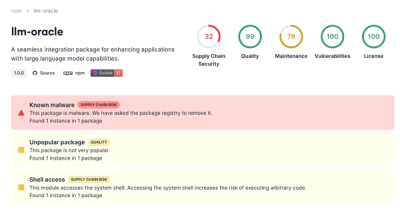
Security News
Python Overtakes JavaScript as Top Programming Language on GitHub
Python becomes GitHub's top language in 2024, driven by AI and data science projects, while AI-powered security tools are gaining adoption.
cordova-plugin-intercom
Advanced tools
This is a plugin that allows your Cordova or PhoneGap app to use Intercom for iOS and/or Intercom for Android.
Intercom for iOS supports iOS 8.x and iOS 9.x. Intercom for Android fully supports API 15 and above but can be integrated in app with API 9 (devices below API 15 will have no Intercom functionality).
To install the plugin in your Cordova app, run the following:
cordova plugin add cordova-plugin-intercom
To add the plugin to your PhoneGap app, add the following to your config.xml:
<plugin name="cordova-plugin-intercom" version="~3.0.11" />
To use Intercom, you must add your app's keys to your config.xml:
<preference name="intercom-app-id" value="your_app_id"/>
<preference name="intercom-ios-api-key" value="ios_sdk-..."/>
<preference name="intercom-android-api-key" value="android_sdk-..."/>
If your app doesn't support iOS or Android, you can omit that API key.
Some users experience Android build errors similar to the following:
UNEXPECTED TOP-LEVEL EXCEPTION:
com.android.dex.DexException: Multiple dex files define Landroid/support/annotation/AnimRes;
...
If you are seeing errors like these it means that another plugin you are using is including Google Play Services or the Android Support library in an outdated way (usually by copying a jar). We recommend you suggest to the plugin vendor that they require this via a <framework> tag or Gradle instead.
Broadly speaking, there are three types of apps that Intercom for mobile will work in.
Firstly, on successful completion of login you will need to register your user.
function successfulLogin() {
...
// Registering with Intercom is easy. For best results, use a unique user_id if you have one.
intercom.registerIdentifiedUser({userId: "123456"});
}
Note: If you don't have a unique userId to use here, or if you have a userId and an email you can register with those too, by calling intercom.registerIdentifiedUser({email: "alice@example.com"}) or intercom.registerIdentifiedUser({email:"alice@example.com", userId: "123456"})
Also, in your app's onDeviceReady function (or wherever you check your user's authenticated state when your app starts up)
onDeviceReady: function() {
if(loggedIn){
...
// We're logged in, we can register the user with Intercom
intercom.registerIdentifiedUser({userId: "123456"});
// Carry on as normal
...
}
}
Finally, when users eventually want to log out of your app, we should clear Intercom's local caches so that when they log back in again, everything works perfectly. In your logout code, simply call intercom.reset(); like so:
function logout() {
...
// This resets the Intercom integration's cache of your user's identity and wipes the slate clean.
intercom.reset();
}
If you only have unidentifed users in your app then your integration is only one line. Just register an unidentified user in when your app starts up, like so:
onDeviceReady: function() {
...
// This registers an unidentifed user with Intercom.
intercom.registerUnidentifiedUser();
...
}
Because Intercom listens for life cycle events, there is no need to have this line of code anywhere else. Intercom will track all of your user sessions for you.
Firstly, on successful completion of login you will need to register your user.
function successfulLogin() {
...
// Registering with Intercom is easy. For best results, use a unique user_id if you have one.
intercom.registerIdentifiedUser({userId: "123456"});
}
Note: If you don't have a unique userId to use here, or if you have a userId and an email you can register with those too, by calling intercom.registerIdentifiedUser({email: "alice@example.com"}) or intercom.registerIdentifiedUser({email:"alice@example.com", userId: "123456"})
Also, in your app's onDeviceReady function (or wherever you check your user's authenticated state when your app starts up)
onDeviceReady: function() {
if(loggedIn){
...
// We're logged in, we can register the user with Intercom
intercom.registerIdentifiedUser({userId: "123456"});
...
} else {
...
intercom.registerUnidentifiedUser();
...
}
}
Finally, when users eventually want to log out of your app, we should clear Intercom's local caches so that when they log back in again, everything works perfectly. In your logout code, simply call intercom.reset(); like so:
function logout() {
...
// This resets the Intercom integration's cache of your user's identity and wipes the slate clean.
intercom.reset();
// Now that you have logged your user out and reset, you can register a new
// unidentified user in their place.
intercom.registerUnidentifiedUser();
}
userId as this field is unique and cannot be changed or updated later. If you only have an email address, you can just register a user with that by calling intercom.registerIdentifiedUser({email: "alice@example.com"}).Intercom allows you to send messages to your users while also enabling your users send messages to you. If you have a dedicated button in your app that you wish to hook the new message composer up to, you can control Intercom's messaging UI via the intercom.displayMessenger(), intercom.displayMessageComposer();, intercom.displayConversationsList(); methods.
If there is an area of your app where you do not wish your users to receive Intercom messages, you can call intercom.setInAppMessageVisibility(intercom.GONE);. To re-enable messages, call intercom.setInAppMessageVisibility(intercom.VISIBLE);.
Attributes such as the user email or a user's name can be updated by calling:
intercom.updateUser({ email: "joe@example.com", name: @"Joe" });
Details of the attributes that can be updated are available here.
Custom user attributes can be created and modified by passing a custom_attributes dictionary You do not have to create attributes in Intercom beforehand.
intercom.updateUser({
custom_attributes: {
paid_subscriber : true,
monthly_spend: 155.5,
team_mates: 3
}
});
You can log events in Intercom based on user actions in your app. Events are different to custom user attributes in that events are information on what Users did and when they did it, whereas custom user attributes represent the User's current state as seen in their profile. See details about Events here.
intercom.logEvent("ordered_item");
Events can optionally include meta data:
intercom.logEvent("ordered_item", {
order_date: 1392036272,
stripe_invoice: "inv_3434343434",
order_number: 123
value: "3434-3434",
url: "https://example.org/orders/3434-3434"
});
Intercom for mobile supports Push Notifications on iOS and Google Cloud Messaging (GCM). To get started, you can read our GCM docs here and our iOS push notification docs here.
To enable iOS push notifications, simply call intercom.registerForPush().
To enable Android push notifications, your Sender ID to your app's config.xml as follows:
<preference name="intercom-android-sender-id" value="YOUR_SENDER_ID"/>
Note: If you use phonegap-plugin-push to support non Intercom push notifications in addition to Intercom's notifications, you must use our fork which is available here. Install it with: cordova plugin add https://github.com/intercom/phonegap-plugin-push.git. We know this is not ideal but unfortunately it is necessary due to the inflexible nature of PushPlugin.
You can find more detailed documentation about Intercom for mobile here.
Thanks to Josh Dover from AskU for making a Cordova plugin for Intercom for iOS which helped lots of people to integrate Intercom in their iOS Cordova apps.
intercom-cordova is released under the MIT License.
Copyright (c) 2016, Inc. All rights reserved.
FAQs
Official Cordova plugin for Intercom
The npm package cordova-plugin-intercom receives a total of 1,366 weekly downloads. As such, cordova-plugin-intercom popularity was classified as popular.
We found that cordova-plugin-intercom demonstrated a healthy version release cadence and project activity because the last version was released less than a year ago. It has 0 open source maintainers collaborating on the project.
Did you know?

Socket for GitHub automatically highlights issues in each pull request and monitors the health of all your open source dependencies. Discover the contents of your packages and block harmful activity before you install or update your dependencies.

Security News
Python becomes GitHub's top language in 2024, driven by AI and data science projects, while AI-powered security tools are gaining adoption.

Security News
Dutch National Police and FBI dismantle Redline and Meta infostealer malware-as-a-service operations in Operation Magnus, seizing servers and source code.

Research
Security News
Socket is tracking a new trend where malicious actors are now exploiting the popularity of LLM research to spread malware through seemingly useful open source packages.